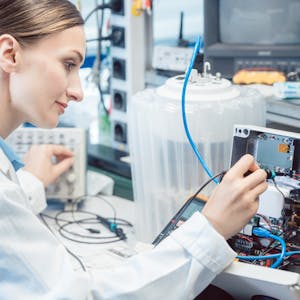Hello, everyone! Welcome to the course on Adding Electronics to Rapid Prototypes, part of the Rapid Prototyping and Tooling specialization. This comprehensive course delves into the basics of electric circuits, breadboards, multimeters, and the incorporation of different types of motors and actuators. Additionally, it provides a thorough understanding of microcontrollers and their application in creating more sophisticated prototypes. Throughout the course, you will engage with electrical simulations and real-world examples from various robotics projects, enabling you to seamlessly integrate electronics into your designs and produce high-quality rapid prototypes.
Join us on this educational journey and unlock the potential to enhance your designs with cutting-edge electronic components!
Certificate Available ✔
Get Started / More Info
This course comprises modules that cover electric circuit basics, electrical connections, motors, and microcontrollers. Gain insights into each aspect to effectively integrate electronics into your prototypes.
The course introduction provides an overview of the instructor, Daniel Frank, and the Rapid Prototyping and Tooling specialization. You'll also receive valuable tips for successful course completion.
Module 1 delves into electric circuit basics, covering the components and functions of a simple electric circuit, as well as the practical use of breadboards and multimeters. Engage in graded and practice quizzes to solidify your understanding.
Module 2 focuses on electrical connections, including soldering, wire connections, and related quizzes. Master these techniques to effectively connect electronic components in your prototypes.
Module 3 explores motors, encompassing motor basics, selection, attachment, and the use of servos and H-Bridges. Engage in practical demonstrations and quizzes to enhance your knowledge in this area.
Module 4 provides an in-depth understanding of microcontrollers, covering the concept, analog and digital signals, and practical application with an Arduino demonstration. Test your knowledge through the module and course quizzes.
Materials Science for Advanced Technological Applications offers an in-depth exploration of materials science and engineering concepts, focusing on strengthening...
Digital Thread: Components is a comprehensive course that delves into the crucial role of the "digital thread" in digital manufacturing and design transformation....
Introduction to Thermodynamics: Transferring Energy from Here to There provides a foundational understanding of energy systems and their applications, equipping...
Protecting the World: Introducing Corrosion Science and Engineering provides a comprehensive understanding of corrosion, its environmental impact, and control measures...